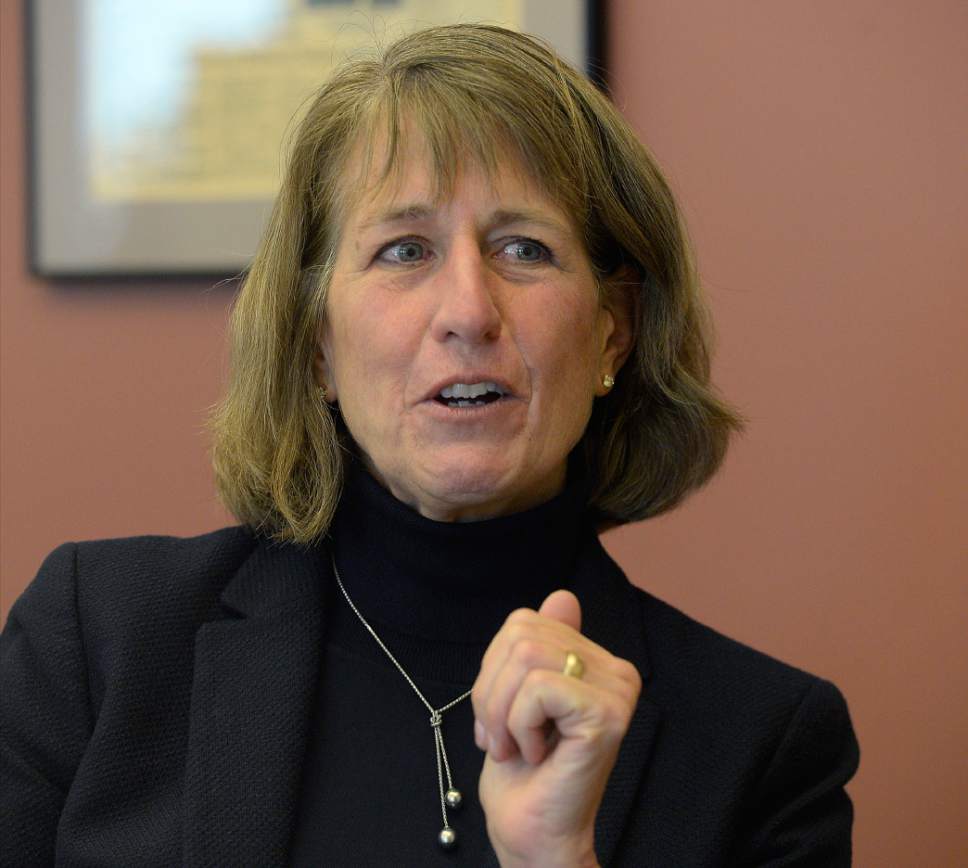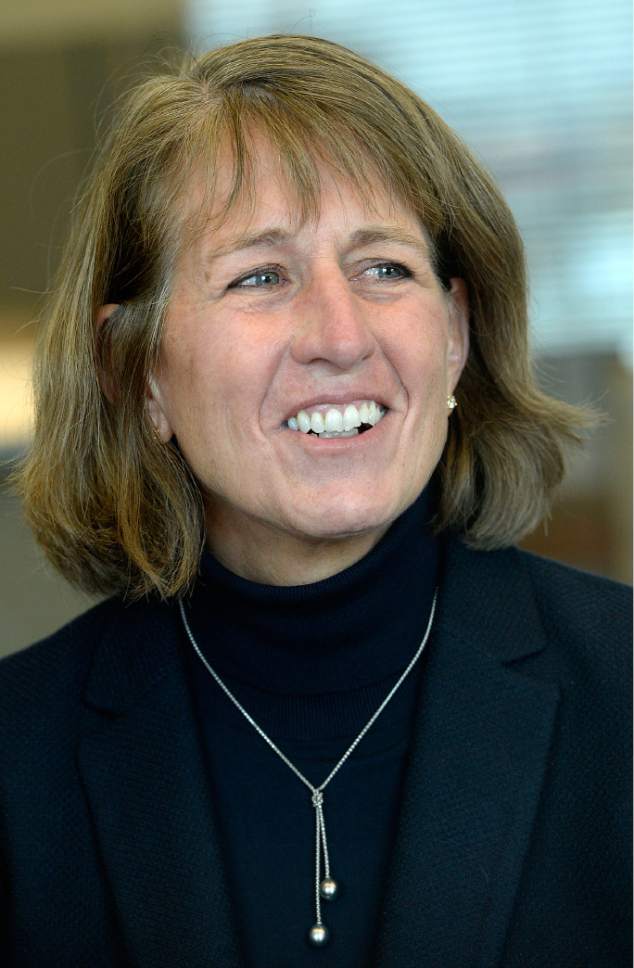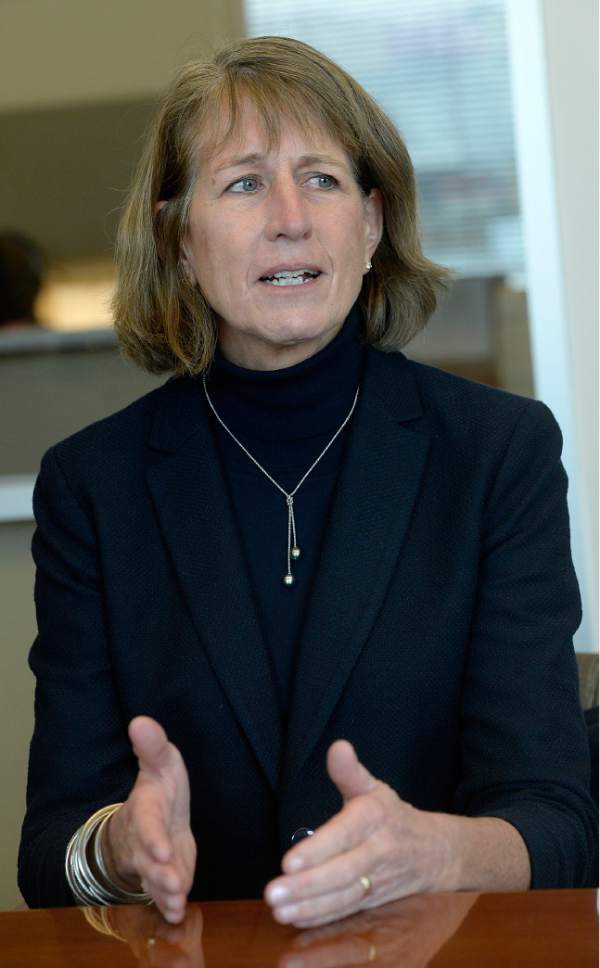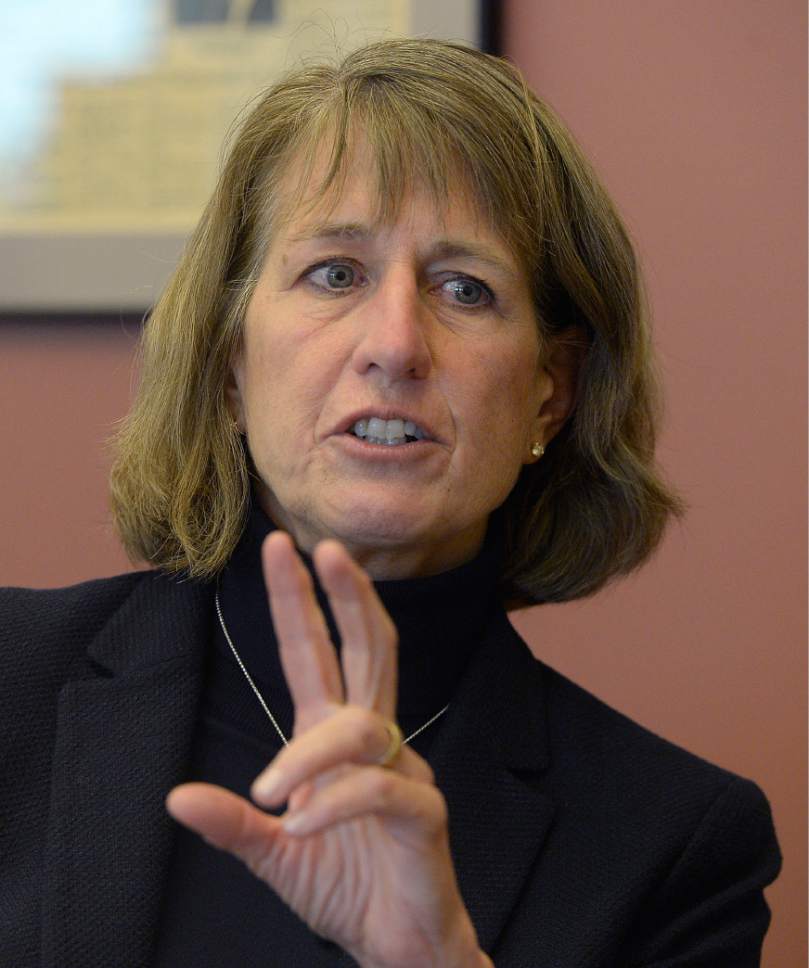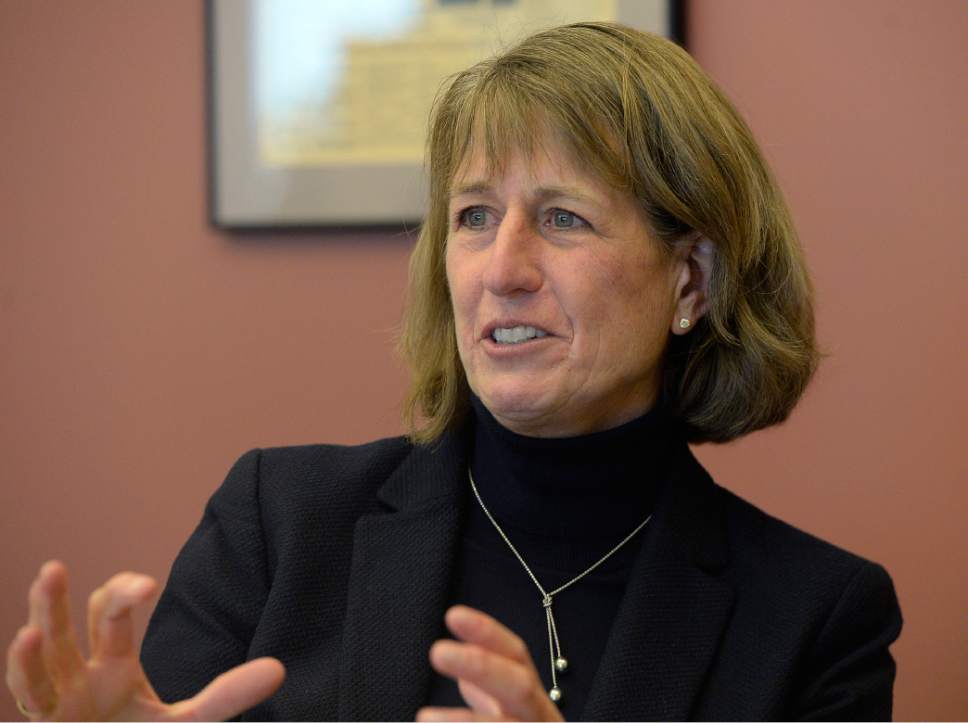This is an archived article that was published on sltrib.com in 2016, and information in the article may be outdated. It is provided only for personal research purposes and may not be reprinted.
Noelle Cockett's formative education years were spent at a small parochial school in rural eastern Montana.
Grades one through 12 were housed in the same building, Cockett said, and students were expected to work to the best of their ability.
"The nuns were very serious about academics, and there was no distinction of gender," she said.
That egalitarian mindset stuck with Cockett, who next month will become the first female president of Utah State University.
And within the Utah System of Higher Education, Cockett will be the only university-level president who is a woman, and the first woman to lead one of Utah's Tier 1 research institutions.
When asked about gender, Cockett both acknowledges and downplays the significance of her promotion to the top office at the Logan campus.
"It shouldn't matter whether I'm male or female," she said. "What I do think matters, though, is I have a different style."
That style, she says, is collaboration and approachability.
She said she's earned a reputation at USU for filling her days with back-to-back meetings and plans to continue seeking input, feedback and perspective from others.
"I don't take lunch," she said. "I don't need to eat."
USU Vice Provost Janet Anderson uses remarkably similar language to describe Cockett's work ethic. Cockett is personable and dedicated, Anderson said, and her door is open to anyone and everyone.
"She just works tirelessly," Anderson said. "I don't think she eats, I don't think she drinks. I think she's just so focused on working and I have no idea how she does that."
USU is unique among the state's public institutions of higher education. As a land-grant school, USU has a physical presence in 28 of Utah's 29 counties, with a formal charge to provide college- and university-level opportunities throughout the state.
Recently, the school has been rocked by a series of sexual assault cases that has called into question the former administration's approach and attention to campus safety.
Many of Cockett's colleagues believe she has the experience and temperament to steer USU through its challenges.
Her previous position as the school's vice president for extension makes her intimately familiar with USU's rural offerings. And outgoing President Stan Albrecht named Cockett chairwoman of a newly created task force to address sexual assault, a role she plans to retain as university president.
"She's the perfect person for this position," Anderson said. "I can't imagine anyone who could do it better."
—
Taking an active role • Cockett's original career aspiration was to be a veterinarian, but her pre-veterinary studies at Montana State University drew her toward science and genetics.
After earning her bachelor's degree, she moved west to get a master's and doctoral degree from Oregon State University, where she also met her husband, John Cockett.
They had a mutual friend, John Cockett said, and the three students rented a house together. But despite living in close proximity, he said it was her participation on the school's rugby team and his spot on the lacrosse team that led to a romantic relationship.
"We started to have some joint social functions," he said. "That really was where we started spending time together."
The couple lived for a time in Nebraska, where Noelle Cockett had a position with the U.S. Department of Agriculture, but relocated to Utah in 1990, due in part to the outdoor recreation of the Beehive State.
"[In Nebraska] there just wasn't enough of the things we enjoy doing," Noelle Cockett said.
She joined Utah State as an assistant professor that year, launching a 26-years-and-counting career at the university that saw her quickly rising through the ranks as a professor, dean of the College of Agriculture and Applied Sciences, vice president for Extension and Agriculture, and provost in 2013.
John Cockett, meanwhile, spent 25 years making the 45-minute commute from Mendon — on the west side of Cache Valley — to Idaho's Malad School District before joining Utah State University last year as technology director for the Emma Eccles Jones College of Education and Human Services.
Because of the compartmentalization of a university campus, John Cockett said he's not worried about being married to the president of the school where he works.
"I rarely see her," he said. "It's really not awkward at all."
The couple have two children, 21-year-old Dylan and 16-year-old Chantelle.
They're river rafters and skiers, and John Cockett described his wife as "good on a tractor" and a gardener who "loves soil under her fingernails."
"She works hard and she plays hard," he said. "When she does unwind she still likes to be very active."
Ashley Waddoups, USU's student body president, served on the selection committee that vetted presidential candidates.
She described Cockett as someone who is concerned about students, easy to talk to and willing to listen.
And a female president, Waddoups said, demonstrates the open-mindedness of Utah State at a time when women continue to face barriers and assumptions in academia.
"I think it's always inspiring for young women to see leadership at that level," Waddoups said. "Not just that she's a woman, but that she's a qualified woman."
John Cockett said the campus community is excited about his wife's promotion, even if she isn't one to make a fuss about being USU's first female president.
"I think they are making a much bigger deal of it than Noelle ever would," he said.
—
'Reason for concern' • This past summer, accusations of sexual assault against a former USU football player by four women came to light, as well as information that campus personnel had apparently failed to fully investigate the claims or discipline the accused student.
That student, Torrey Green, has since been charged with rape, forcible sex abuse and aggravated kidnapping, stemming from seven separate alleged attacks.
Green's case, which is ongoing, came less than a year after two other USU students admitted to assaulting women at two different fraternity houses. A woman in one of those cases has since sued the school, accusing USU of violating federal law by not responding to multiple allegations against her attacker, Jason Relopez.
An internal review launched by the university determined it "fell short" in its response to assault claims made against Green in 2015. Administrators updated policies to ensure amnesty and confidentiality for victims and launched a task force to oversee future efforts aimed at improving campus safety.
Cockett chairs the task force, which in turn coordinates the efforts of three working groups.
She said some actions, like the updates to amnesty and confidentiality, were already practiced but needed to be formalized.
"They were being done but hadn't been put in the student policy," she said, "so students may not have known."
USU also launched an online reporting system in August, Cockett said, which seeks to tighten communication gaps by ensuring that all reports of sexual assault reach the university's Title IX coordinator.
She described the system as a "clearinghouse," making it easier for Title IX staff to identify patterns in campus attacks or to combine multiple accusations against the same individual.
"I see that as probably the biggest vulnerability we had," Cockett said. "It was not well known how you actually made a report."
Waddoups said those steps, including an campus-wide awareness campaign aimed at affirmative consent, have increased morale and trust.
"After some of the things that happened in the summer, there was definitely a reason for concern," she said.
The three working groups — structured around prevention, policy and campus climate — meet regularly, but have so far been closed to the public.
Cockett said the closed-door setting is intended to facilitate discussion before strategies are put forward for public participation.
"We don't want to limit any idea," she said. "Once we meet as a task force, that would probably be the best venue."
Beyond campus safety, Cockett said her goals focus on student success, from additional mental heath and counseling services to more robust internship and career opportunities and flexible course schedules.
And behind all those efforts, she said, is a need for additional resources from the state to preserve low student costs.
"Keeping the tuition where it is will be a challenge where the state maybe is not able to help us on some new things that we need to do," she said.
Waddoups said she's looking for the next administration to celebrate and encourage diversity, welcoming individuals from different faiths, races, sexualities and nationalities.
"I'm very optimistic for the future," Waddoups said. "I'm excited to see what she can do and think the university is in very capable hands."
—
True Aggie • When Cockett became USU's provost, she was succeeded as vice president for extension by Ken White.
That position oversees the university's regional and satellite campuses, and White said the experience, more that anything, laid the groundwork for Cockett to become USU president.
"She's traveled the state," he said. "She understands the issues that are facing people in very small and very rural communities as well as some of the more urban footprint counties in the state."
White joined Utah State University in 1991, one year after Cockett, and he said they worked in "cross-pollinating" fields as researchers.
He said Cockett is a strong and highly qualified candidate, and he was excited when her selection was announced.
"She's an excellent colleague," he said. "She values other people's opinions and she values others' expertise."
Asked to describe USU's role in Utah's higher education system, Cockett immediately points to its land-grant status. She speaks with pride about how students in all corners of the state are completing technical certificates, doctoral degrees and everything in between through Utah State University.
"We're the residential campus in Logan, with all of its embodiments," she said. "But then all through the rest of the state you can get a college degree through our system."
USU graduates are proud to call themselves "Aggies," she says — although her eastern-Montana accent lands closer to "egg" on the first syllable — while she struggles to remember the mascot of Montana State University, where she studied.
"I think they're grizzlies. They're the little lynx, or bobcats," she said, eventually landing on the correct animal. But "I never say, 'I'm a Bobcat.' To me, 'I'm an Aggie' embodies an image."
That collective identity is something to preserve, she says, and encourage.
Cockett was selected from a pool of roughly 40 candidates, according to Dave Buhler, Utah's commissioner of higher education.
She is a known entity at Utah State, Buhler said, but also someone with a distinguished career.
In Cockett, he said, USU is getting a president with experience as a university administrator, a classroom educator, and a researcher best known for her role on the team that sequenced the sheep genome.
"She really understands Utah State's mission," he said. "She's lived it for a number of years, and she will be a great president."


